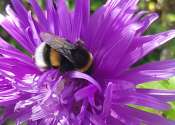Bumblebees don't care about pesticide cocktails: Research highlights their resilience to chemical stressors
Bumblebees appear to be quite resistant to common pesticides. This is shown by a new study, the results of which have now been published by scientists from Julius-Maximilians-Universität Würzburg (JMU) in the journal Environment ...









